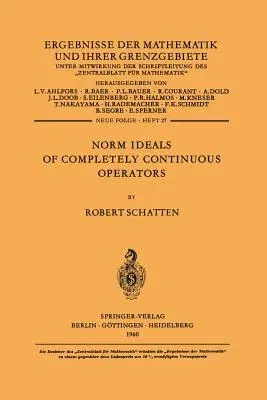Robert Schatten
(Author)Norm Ideals of Completely Continuous Operators (Softcover Reprint of the Original 1st 1960)Paperback - Softcover Reprint of the Original 1st 1960, 5 April 2012

Qty
1
Turbo
Ships in 2 - 3 days
In Stock
Free Delivery
Cash on Delivery
15 Days
Free Returns
Secure Checkout
Part of Series
Ergebnisse Der Mathematik Und Ihrer Grenzgebiete. 2. Folge
Print Length
83 pages
Language
English
Publisher
Springer
Date Published
5 Apr 2012
ISBN-10
3642876544
ISBN-13
9783642876547
Description
Product Details
Author:
Book Edition:
Softcover Reprint of the Original 1st 1960
Book Format:
Paperback
Country of Origin:
NL
Date Published:
5 April 2012
Dimensions:
23.39 x
15.6 x
0.51 cm
ISBN-10:
3642876544
ISBN-13:
9783642876547
Language:
English
Location:
Berlin, Heidelberg
Pages:
83
Publisher:
Weight:
145.15 gm

